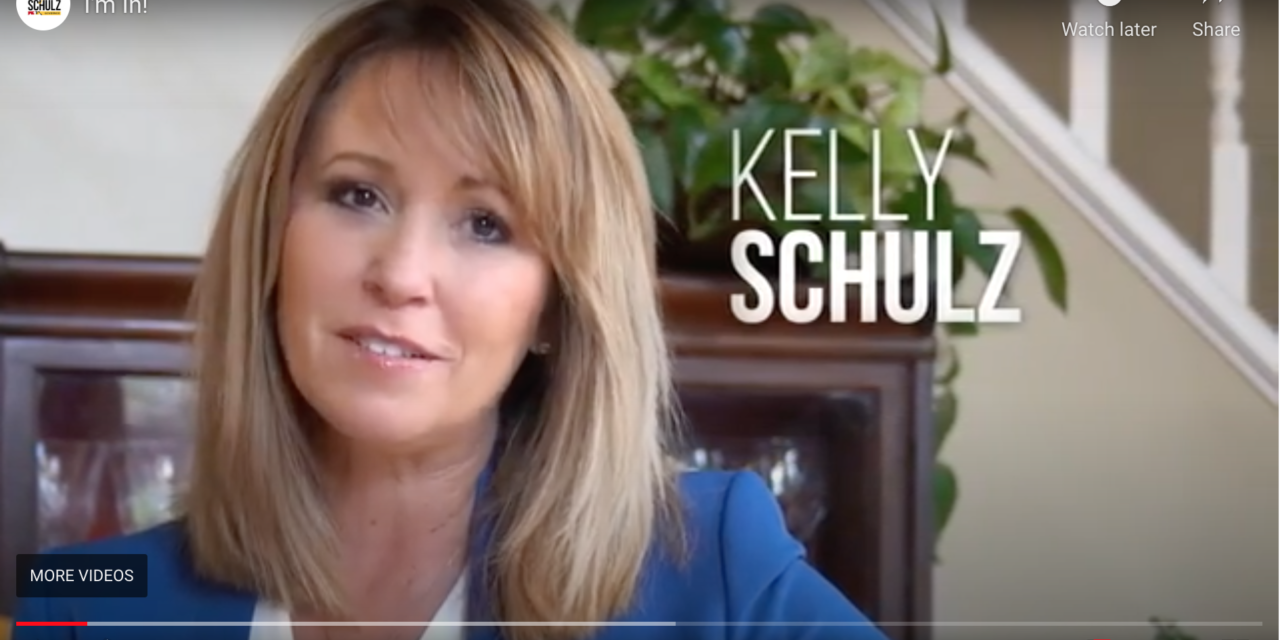Schulz: ‘I don’t think that Marylanders want one party rule’
Maryland Commerce Secretary Kelly Schulz (R) announced her candidacy for governor in April (Screenshot)
@BryanRenbaum
With Democrats having a solid vet0-proof majority in the General Assembly, the state’s voters might be better served by electing another Republican to succeed two-term incumbent Gov. Larry Hogan next year, according to state Commerce Secretary and GOP gubernatorial candidate Kelly Schulz.
“I think Marylanders are starting to understand that. That one party rule in the executive branch and in the legislative branch does not help them,” Schulz told MarylandReporter.com in a recent interview.
“It does not create a dialogue. It does not help to bring real solutions to problems. I do not believe that raising taxes is the ultimate solution to anything,” Schulz added.
The commerce secretary doubled-down on her assertion.
“I don’t think that Marylanders want one party rule. I think they want the checks and balances. I think they want the dialogue. I think that is why we can be more open at the end of the day. Not just about the party. But about the person that is there to take on the leadership.”
Schulz’s argument is bolstered by a recent Goucher College poll which found that nearly half of Maryland voters said they would support a Hogan-type Republican over a moderate Democrat in the governor’s race. The poll also found that more than half of the state’s voters said they would support a Hogan-type Republican over a progressive Democrat in that race.
But is Schulz correct? Do Marylanders prefer divided government?
“We have obviously seen that play out with Governor Hogan. We also saw that with Governor Ehrlich,” Del. Brian Chisholm, R-Anne Arundel, said.
Chisholm noted that Democrats have a 2-1 registration advantage over Republicans in the state and that that is something that many voters are mindful of when casting their ballots.
“I think that people are always going to vote in a way that they feel is going to bring some balance, knowing that we are still a strongly Democratic state.”
Former Gov. Parris Glendening, a Democrat, said Schulz’s claim about public discomfort with one party rule has a considerable degree of merit.
“From a purely political science perspective, she is generally right. There is an American, not just a Maryland-reluctance to have too much concentration of power in one party’s hands. You can see that throughout our history.”
Glendening, who was first elected in 1994, said the trend may have begun that year when Republicans took control of both houses of Congress for the first time in a generation.
Glendening said what had happened at the federal level trickled down to states like Maryland, noting that only he and one other Democrat were newly elected state governors that year.
Glendening also noted that he was succeeded in office by Ehrlich, who then became the state’s first GOP governor since the 1960s. And that four years later, Ehrlich was succeeded by Democrat Martin O’Malley, who went on to serve two terms before he was succeeded by Hogan.
Still, political trends are not set in stone, Glendening said.
“She (Schulz) has a better chance because of that phenomenon. But she should not start measuring the drapes yet.”
But Schulz isn’t taking anything for granted.
“My first strategy is to be able to win the Republican nomination.”
Schulz is considered the establishment favorite in the GOP primary.
The contest includes three other candidates that are not considered to be serious challengers.
They are: Del. Dan Cox, attorney and former delegate Robin Ficker, and former congressional candidate Joe Werner.
Nine Democrats are running for governor.
Comptroller Peter Franchot is considered one of the leading candidates in that race.
His campaign sought to counter Schulz’s premise in a statement to MarylandReporter.com.
“Marylanders are looking for a governor who understands the path to achieving a better quality of life and a thriving economy is collaboration, not a combative relationship between the executive and the legislature, or the state and local governments. The Goucher Poll recently found that jobs and the economy are the main issues for most Marylanders as the state continues to recover from the COVID-19 pandemic. Peter Franchot is focused on ensuring we truly build back better, not party line back and forth.”

MarylandReporter.com is a daily news website produced by journalists committed to making state government as open, transparent, accountable and responsive as possible – in deed, not just in promise. We believe the people who pay for this government are entitled to have their money spent in an efficient and effective way, and that they are entitled to keep as much of their hard-earned dollars as they possibly can.

